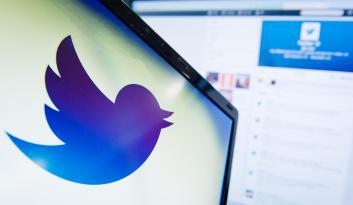“Was Huma Abedin wearing beer goggles the night she met Anthony Wiener? Almost as bad a pairing as Samantha Powers and Cass Sunstein” tweeted @natsecwonk, a popular anonymous tweeter who was revealed by the Daily Beast this week to be senior National Security Council staffer Jofi Joseph. In an ironic turn, Joseph has now suffered the same fate as his once-Twitter target Wiener: losing a high-profile political position due to reckless tweeting.
Joseph was fired last week when he was linked to the snarky pseudonymous Twitter handle that, for more than two years, had been posting pointed insults about political figures—he even accused one of leaking classified information about the computer worm Stuxnet. Joseph himself did not disclose any classified information in his tweets, which mainly seem to consist of a series of petty and personal attacks along the lines of: “So when will someone do us the favor of getting rid of Sarah Palin and the rest of her white trash family? What utter useless garbage” and “ ‘Has shitty staff.’ #ObamaInThreeWords.”
It’s not against the law to say nasty things about your coworkers, but it should come as no surprise by now that that people can lose their jobs for careless behavior on social media. In May, a Florida teacher was asked to resign for posting racy photos on her Facebook page, and last month two workers at North Dakota barbecue restaurant Famous Dave’s were fired for posting Facebook photos in which one of them held a sign suggesting Native Americans tip poorly. But the rules for what kind of online activity are grounds for termination remain murky. Also in May, a New York appeals court ruled to reinstate a teacher who initially lost her job for posting to Facebook, the day after a student drowned during a field trip to the beach, “After today, I am thinking the beach sounds like a wonderful idea for my 5th graders! I HATE THEIR GUTS! They are the devils spawn!”
What sets Joseph apart from the majority of people who lose their jobs by way of social media is that he took pains to anonymize his online activity. Twitter, unlike Facebook and Google+, does not require users to create accounts under their own names. Many Twitter users—including Anthony Weiner—do link their accounts to their real-life identities, but others do not, leading to a wide variety of anonymous novelty accounts and humorous parody accounts for famous people. And as Joseph’s story reminds us, Twitter is not just a place where anonymous everyday people can take on the voice of famous individuals. It’s also a place where powerful and high-profile figures can take on the voice of anonymous, uninhibited handles.
But social media identities are rarely completely anonymous, even when they are not governed by real name policies. Online activity almost always leaves a trail. Part of that trail is technical—companies like Twitter and Facebook log IP addresses and other data associated with user logins, which courts can compel them to turn over in certain cases—but it’s not clear that the Joseph investigation relied on any such technical tracing via Twitter’s internal records.
Instead, Politico reported, Joseph’s identity was revealed following a “months-long probe” that “included an investigation into Joseph’s travel and shopping patterns—parsed from over 2,000 tweets.”
Reading through Joseph’s tweets, it’s not hard to imagine how a careful analysis of whom he discussed and what he talked about might be enough to let investigators deduce his true identity. His tweets read almost like a trail of breadcrumbs, dropping clues about whom the author worked with, what events he attended, what issues he followed. An investigation into Joseph’s travel and shopping patterns might mean trying to geo-locate IP addresses used to access the Twitter account at certain times and then matching that location data to places where Joseph was known to be shopping and traveling. But the fact that these patterns were “parsed” from the corpus of tweets suggests the investigation may instead have involved mining the text of the thousands of tweets posted from the now-deleted account to identify specific stores, restaurants, or destinations that Joseph visited. Or perhaps the timing of the tweet postings was analyzed and compared against Joseph’s known patterns of behavior and daily schedules. Piecing together these types of behavioral data may not be easy—the investigation into @natsecwonk’s identity apparently lasted months—but it’s far from impossible.
Technical clues are only part of the identity trail we create on social media sites. The ways in which our behavior and relationships on Facebook and Twitter mirror and intersect with our real-life behavior and relationships can provide equally powerful clues about who we really are. In some cases these social hints may be even more significant than technical traces—after all, an IP address can be spoofed, but an intimate knowledge of the inner workings of the White House national security operation is harder to fake.
It’s difficult to definitively prove that a specific person did something online—even an account tied to a real person’s name may have been hacked—but often there’s a fair bit of circumstantial evidence available. And ultimately, Joseph admitted to being the author of the account and apologized in an email to Politico, writing, “What started out as an intended parody account of DC culture developed over time into a series of inappropriate and mean-spirited comments. I bear complete responsibility for this affair and I sincerely apologize to everyone I insulted.”
Joseph intended to pen one of the entertaining, satirical commentary accounts that Twitter has become famous for—accounts like @justin_buber, @notzuckerberg, @queen_uk, or @PimpBillClinton—but he ended up in the middle of a career-ending debacle instead. Sure, he kept the account running for more than two years, but ultimately he ran into the fundamental problem of trying to remain anonymous in an online social world where—much like in Washington, D.C.—the whole point is to network, to connect with other people, to know and be known.
